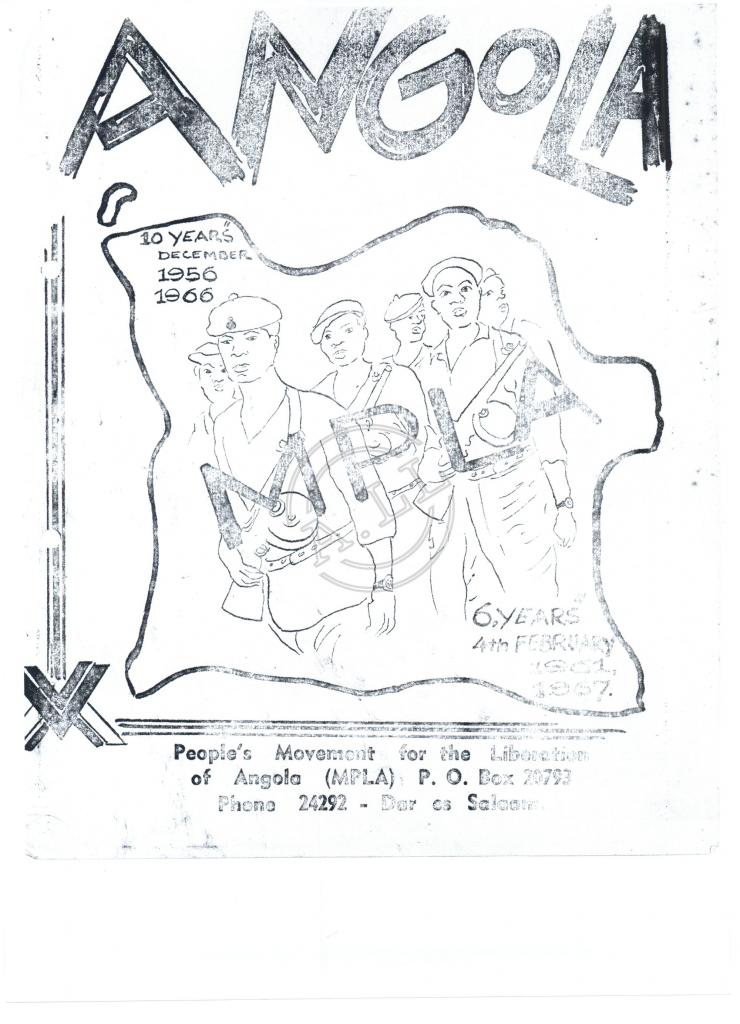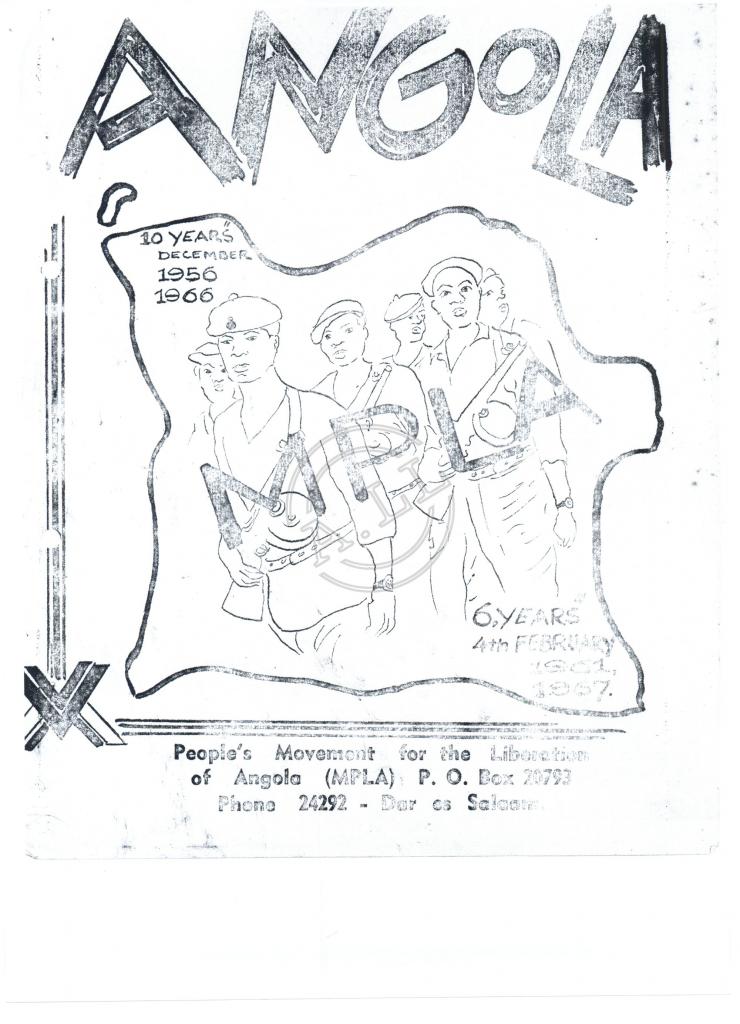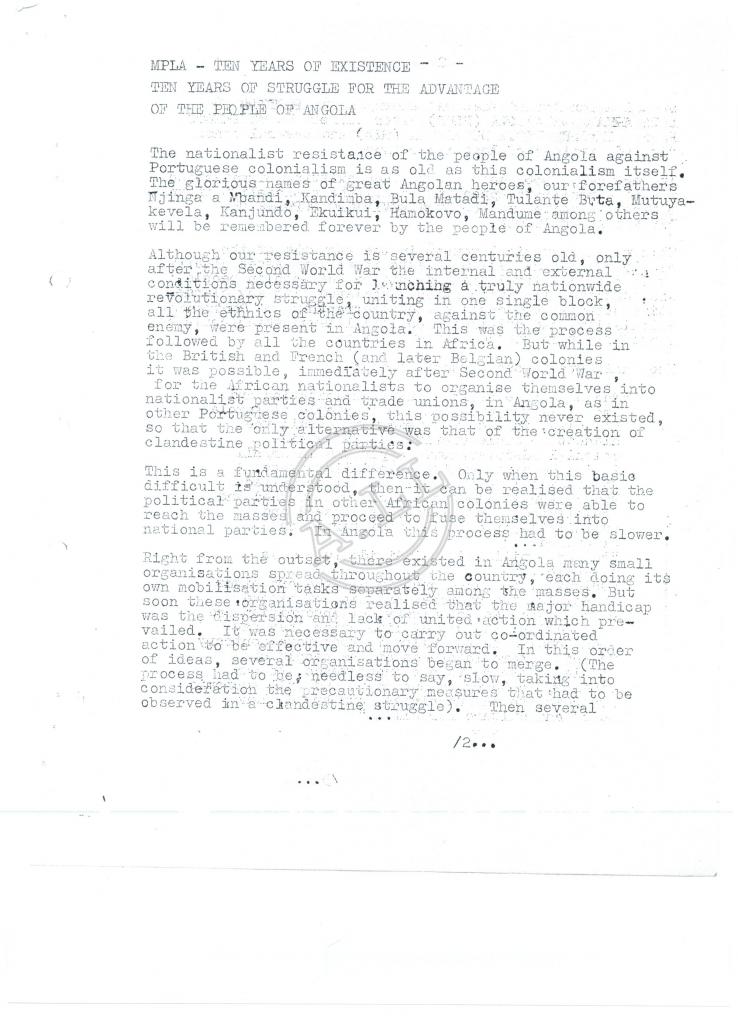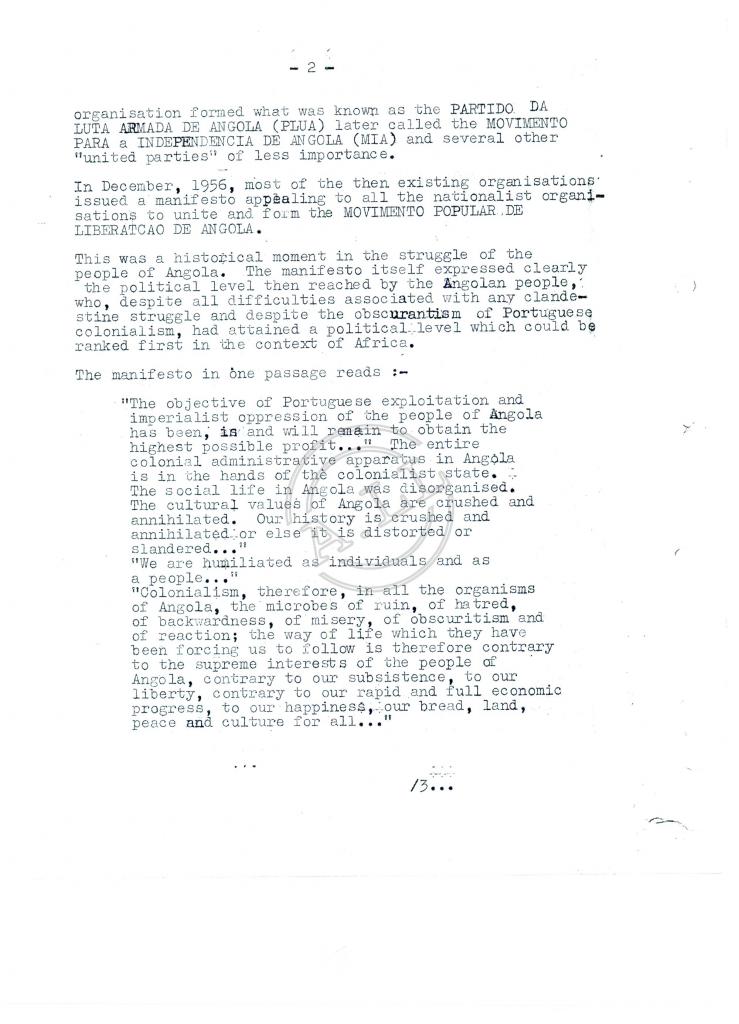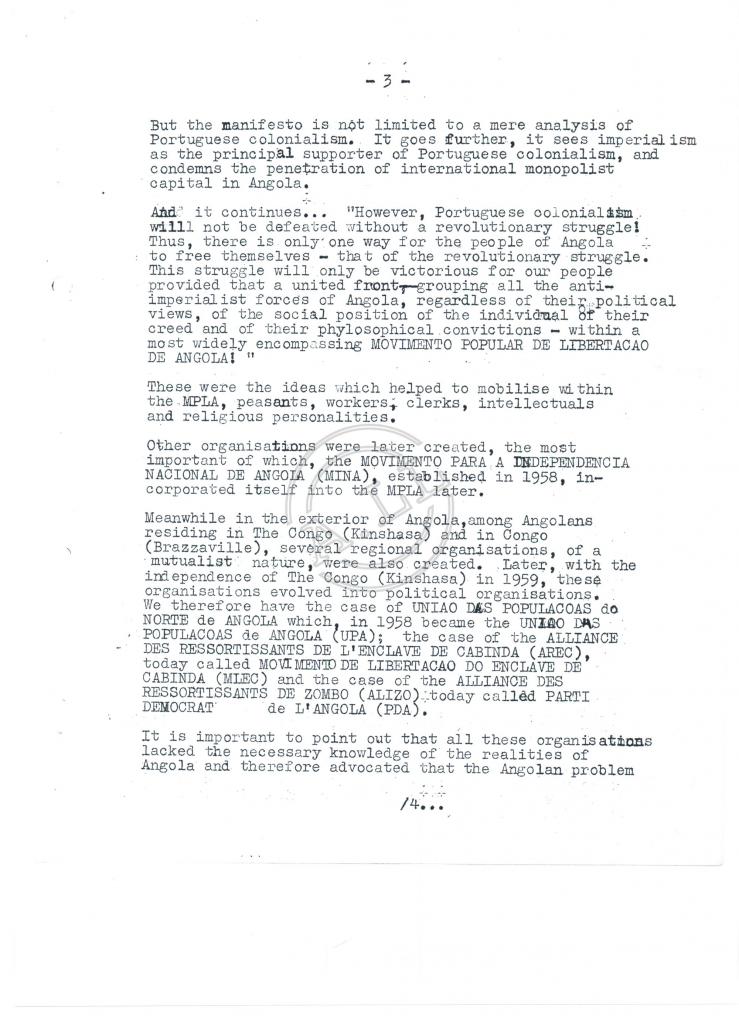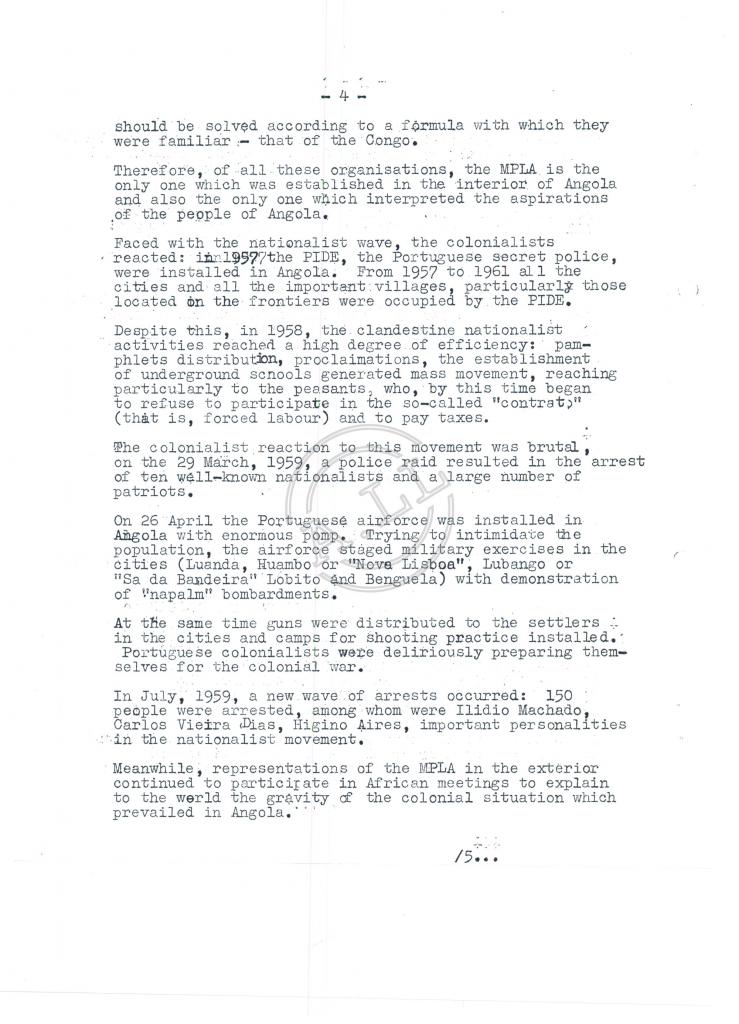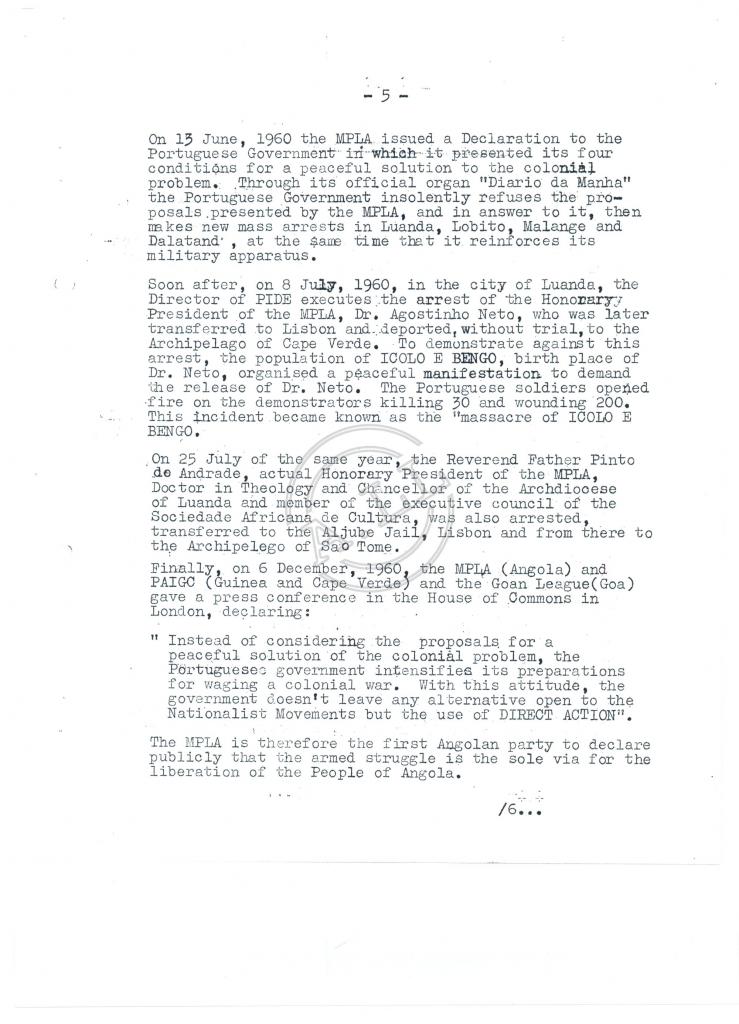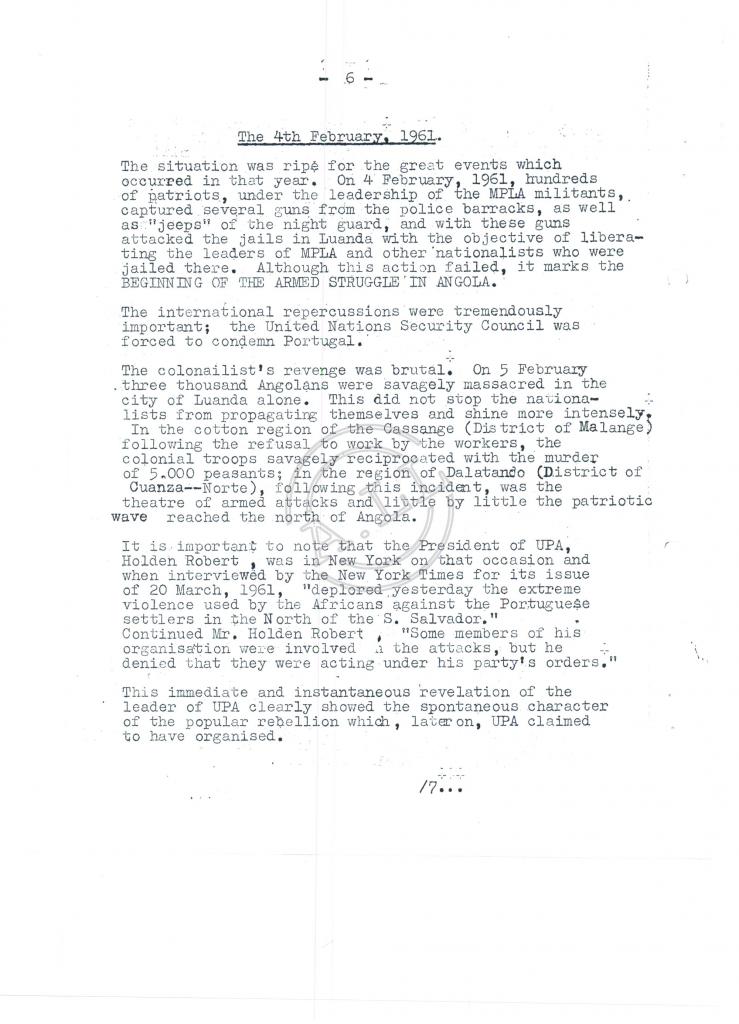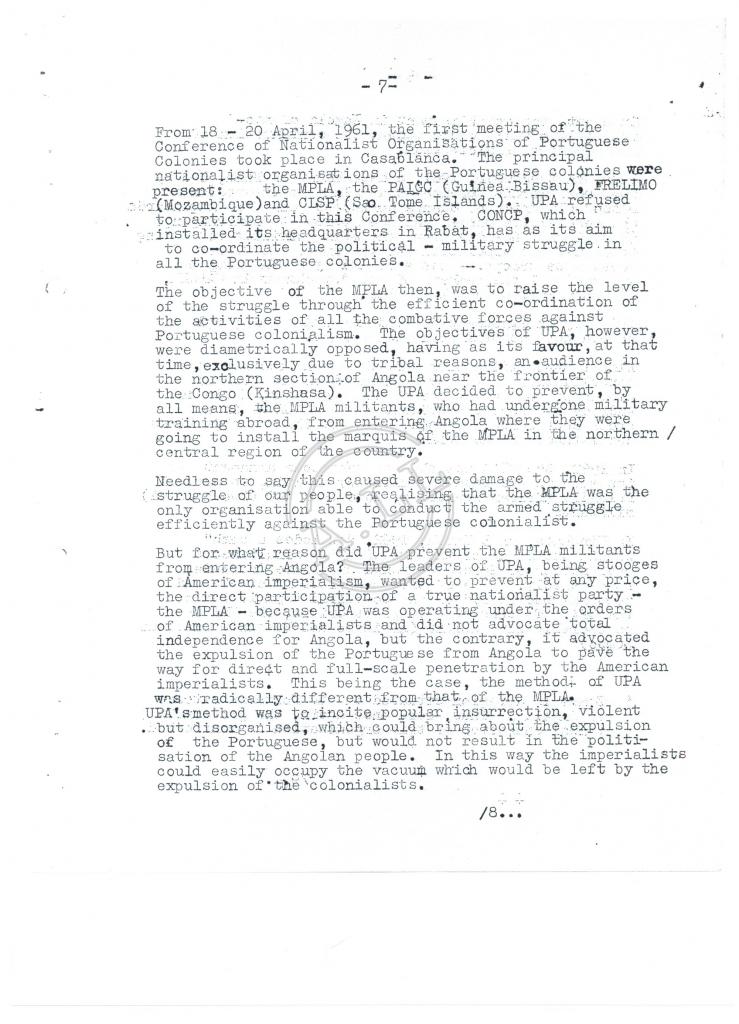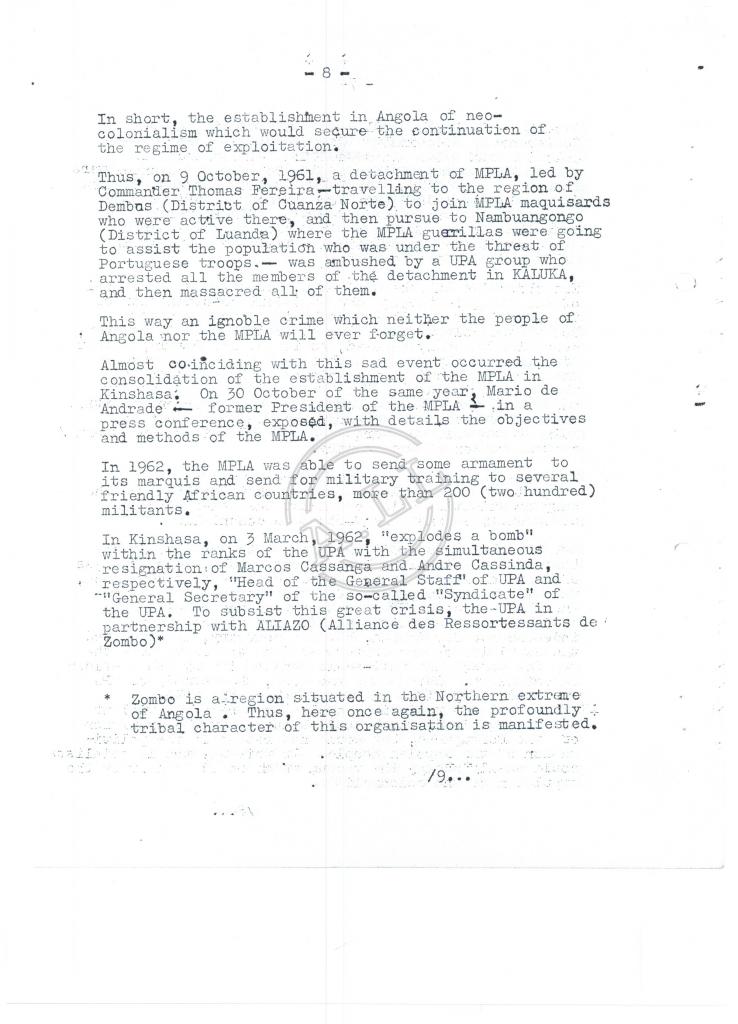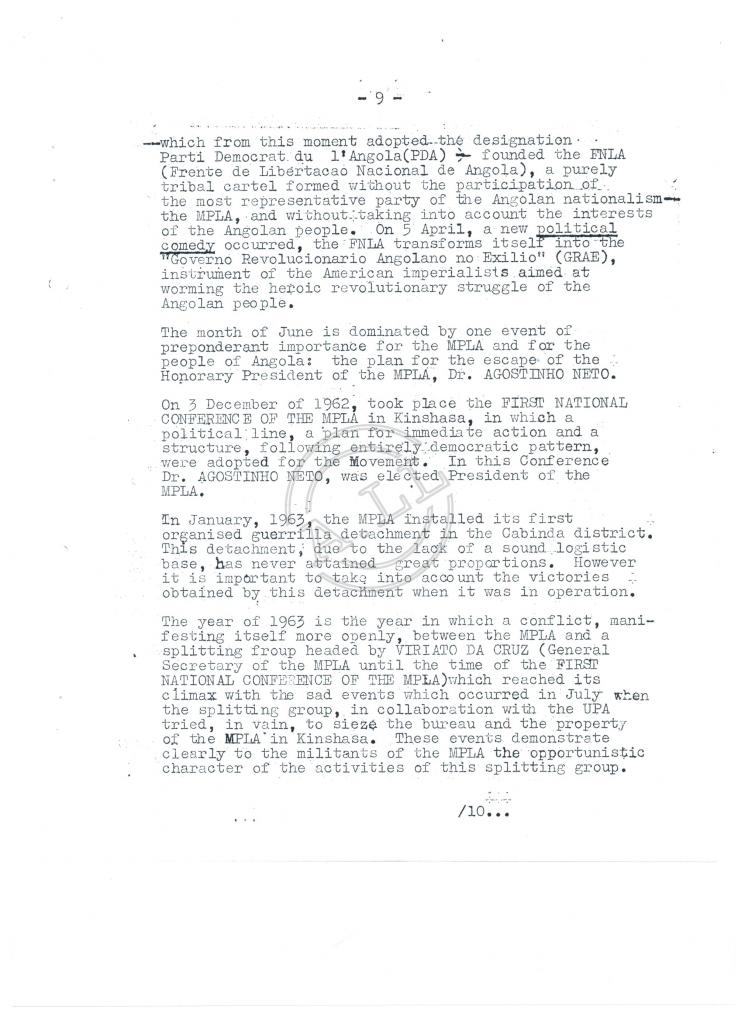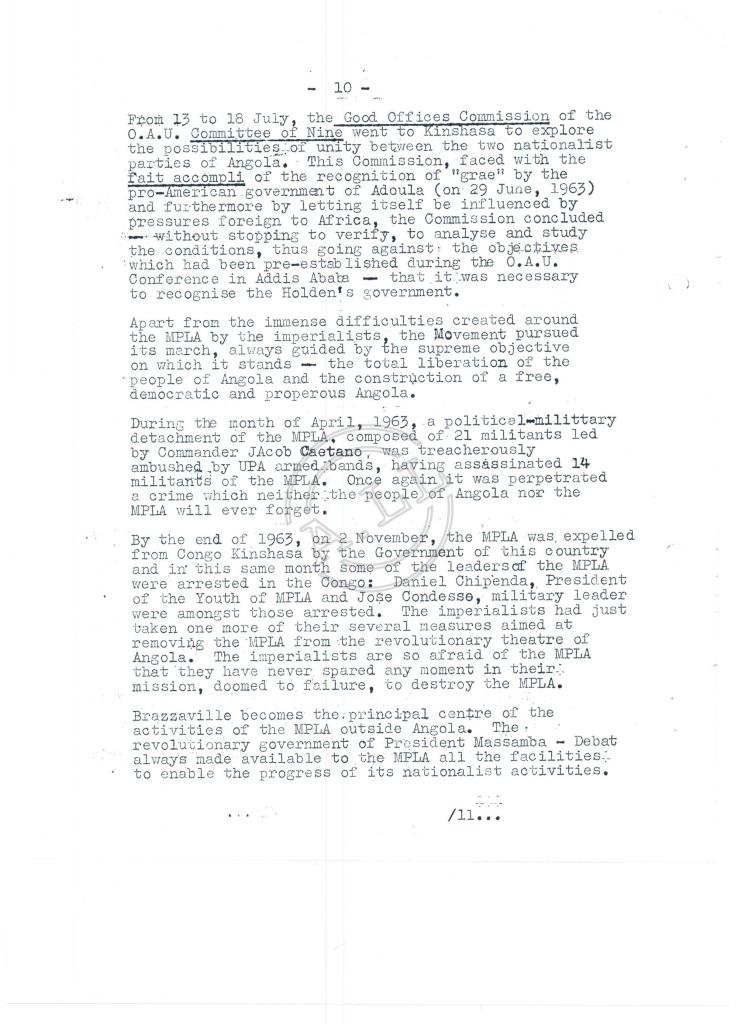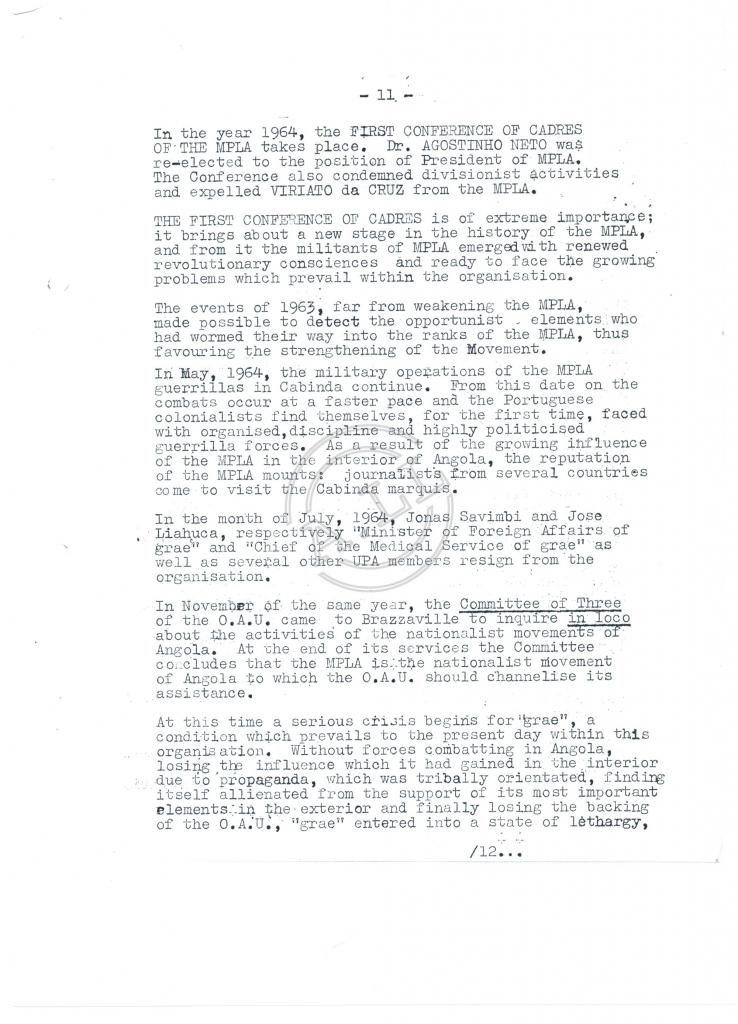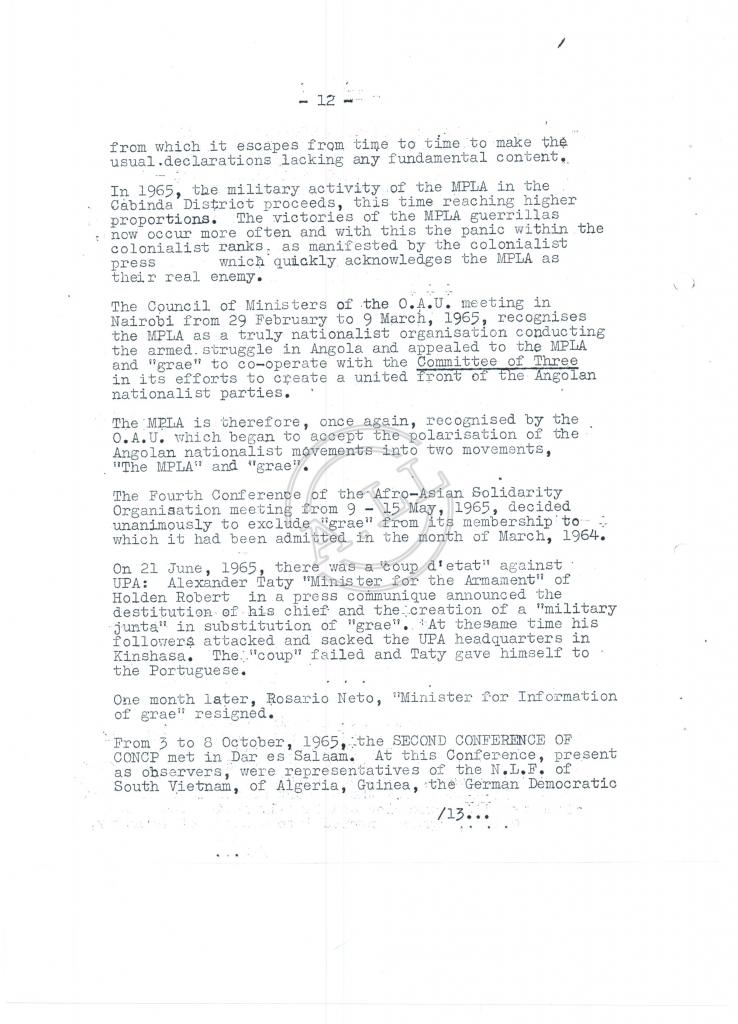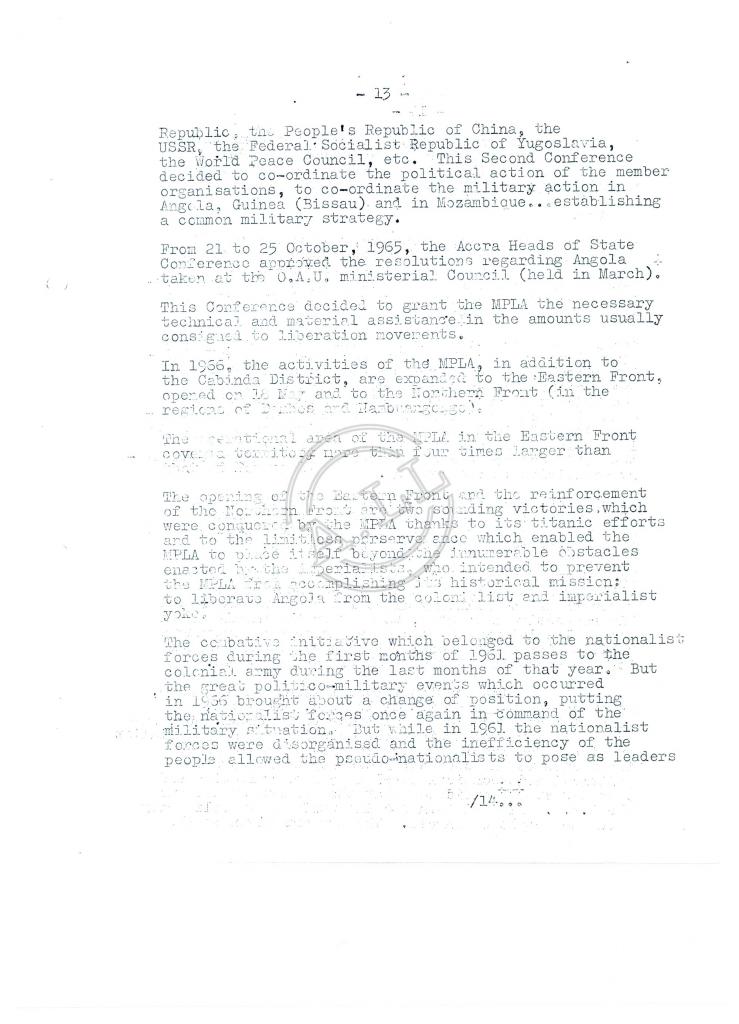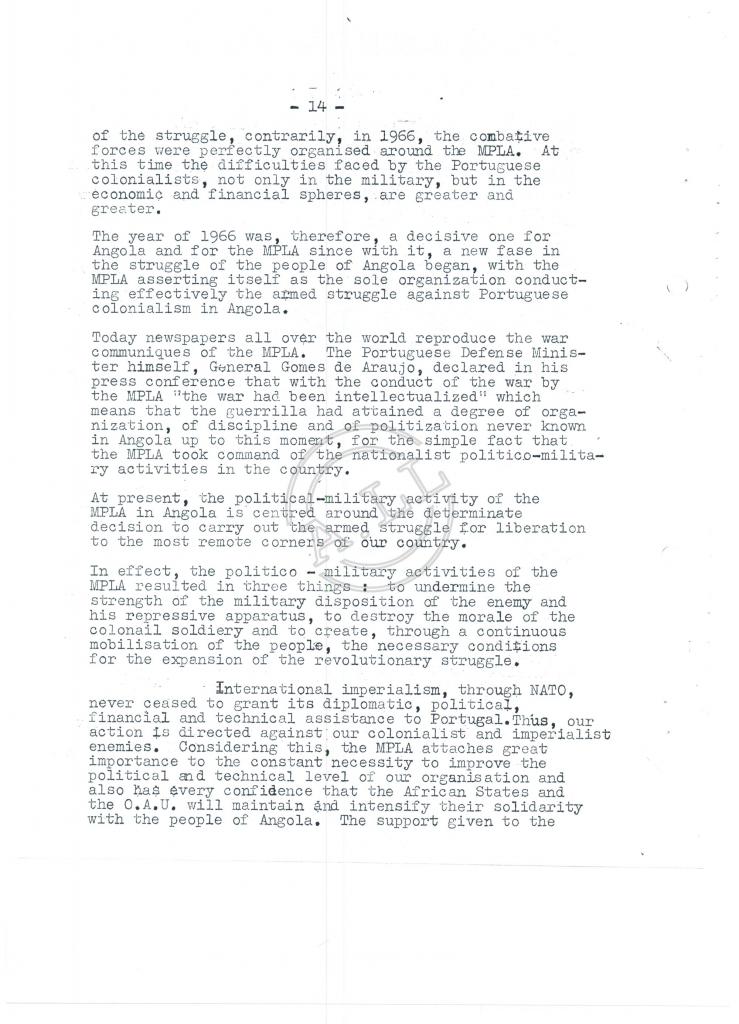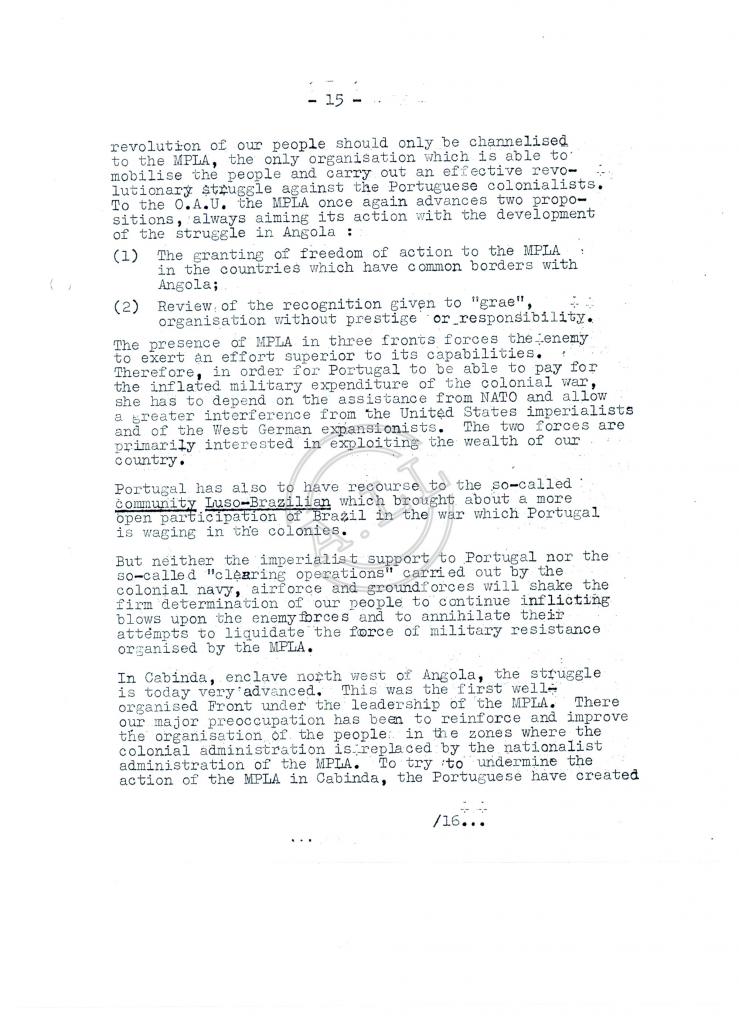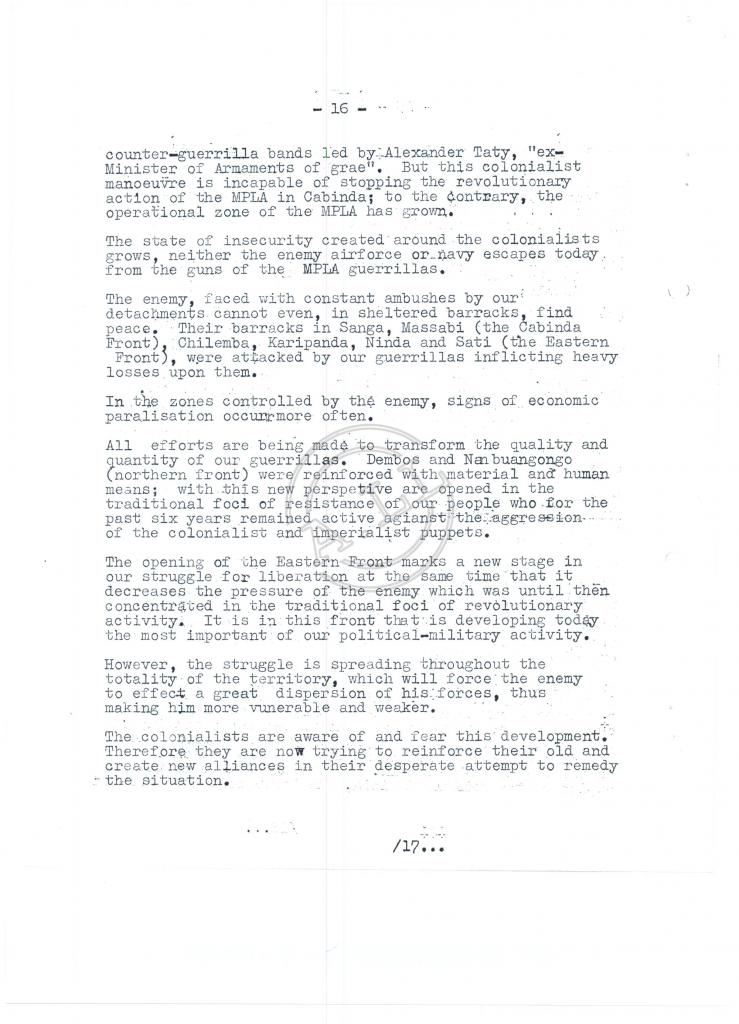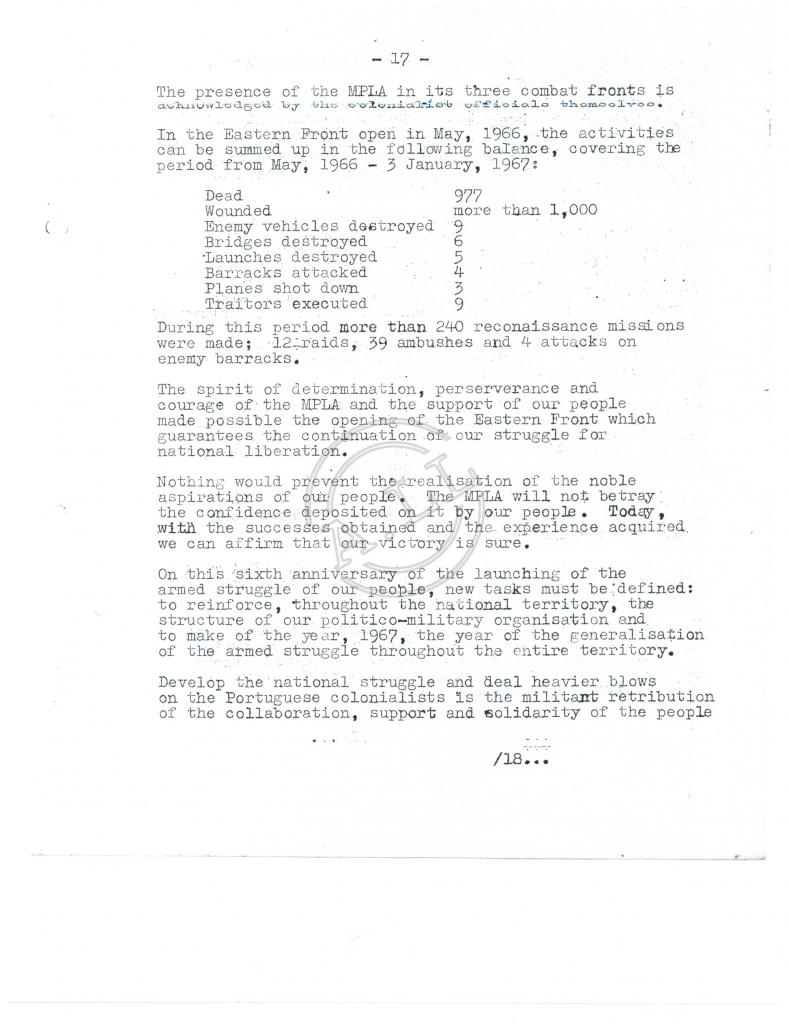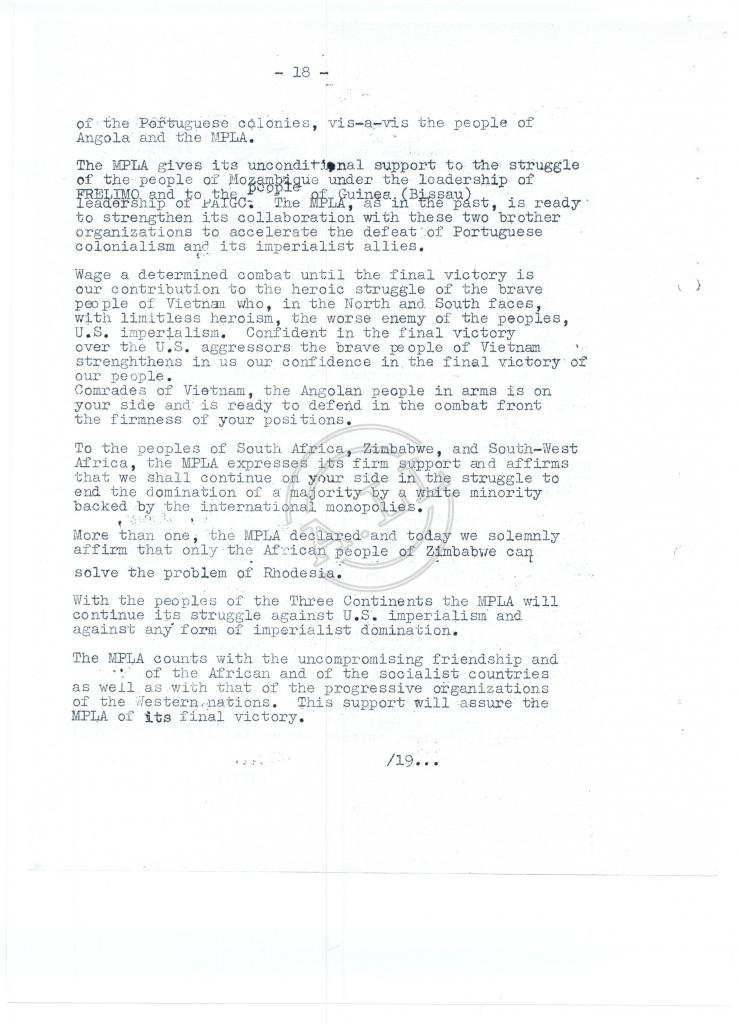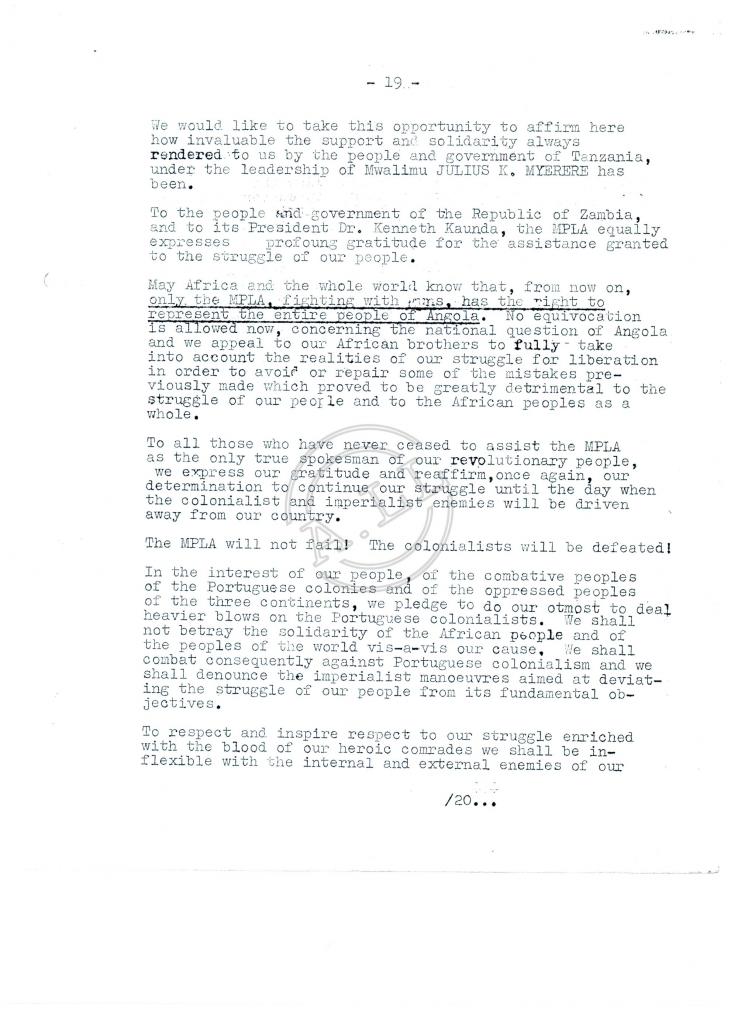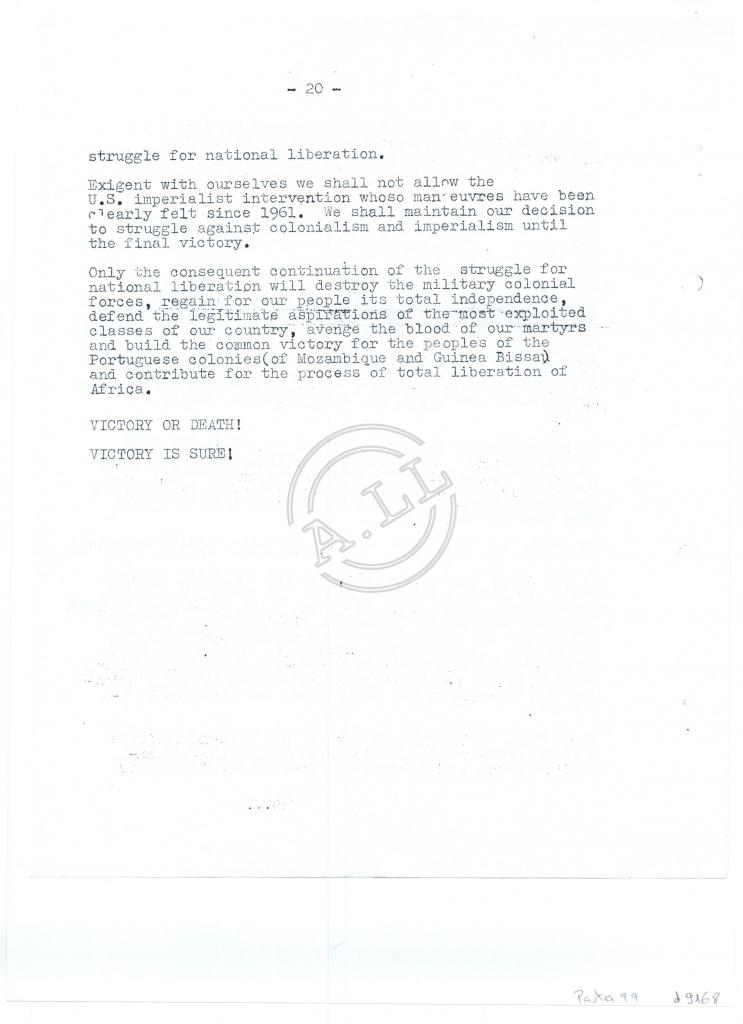Cota
0099.000.051
Tipologia
Texto de Análise
Impressão
Policopiado
Suporte
Papel Comum
Autor
MPLA - Movimento Popular de Libertação de Angola
Locais
Data
1967
Idioma
Conservação
Bom
Fundo
Imagens
21
ANGOLA
10 years
December
1956
1966
People’s Movement for the Liberation of Angola (MPLA) P.O. Box 20793
Phone 24292 - Dar es Salaam
MPLA - TEN YEARS OF EXISTANCE - TEN YEARS OF STRUGGLE FOR THE ADVANTAGE OF THE PEOPLE OF ANGOLA
The nationalist resistance of the people of Angola against Portuguese colonialism is as old as this colonialism itself. The glorious names of great Angolan heroes, our forefathers Njinga a Mbandi, Kandimba, Bula Matadi, Tulante Buta, Mutuyakevela, Kanjundo, Ekuikui, Hamokovo, Mandume among others will be remembered forever by the people of Angola.
Although our resistance is several centuries old, only after the Second World War the internal and external conditions necessary for launching a truly nationwide revolutionary struggle, uniting in one single block, all the ethnics of the country, against the common enemy, were present in Angola. This was the process followed by all the countries in Africa. But while in the British and French (and later Belgian) colonies it was possible, immediately after Second World War, for the African nationalists to organise themselves into nationalist parties and trade unions, in Angola, as in other Portuguese colonies, this possibility never existed, so that the only alternative was that of the creation of clandestine political parties:
This is a fundamental difference. Only when this basic difficulty is understood, then it can be realized that the political parties in other African colonies were able to reach the masses and proceed to fuse themselves into national parties. In Angola this process had to be slower.
Right from the outset, there existed in Angola many small organisations spread throughout the country, each doing its own mobilisation tasks separately among the masses. But soon these organisations realized that the major handicap was the dispersion and lack of united action which prevailed. It was necessary to carry out co-ordinated action to be effective and move forward. In this order of ideas, several organisations began to merge. (The process had to be, needless to say, slow, taking into consideration the precautionary measures that had to be observed in a clandestine struggle). Then several organisations formed what was known as the PARTIDO DA LUTA ARMADA DE ANGOLA (PLUA) later called the MOVIMENTO PARA A INDEPENDÊNCIA DE ANGOLA (MIA) and several other “united parties” of less importance.
In December, 1956, most of the then existing organisations issued a manifesto appealing to all the nationalist organisations to unite and form the MOVIMENTO DE LIBERTAÇÃO DE ANGOLA.
This was a historical moment in the struggle of the people of Angola. The manifesto itself expressed clearly the political level then reached by the Angolan people, who, despite all difficulties associated with any clandestine struggle and despite the obscurantism of Portuguese colonialism, had attained a political level which could be ranked first in the context of Africa.
The manifesto in one passage reads:
“The objective of Portuguese exploitation and imperialist oppression of the people of Angola has been, is and will remain to obtain the highest possible profit...” The entire colonial administrative apparatus in Angola is in the hands of the colonialist state. The social life in Angola was disorganized. The cultural values of Angola are crushed and annihilated. Our history is crushed and annihilated or else it is distorted or slandered...”
“We are humiliated as individuals and as a people...”
“Colonialism, therefore, in all the organisms of Angola, the microbes of ruin, of hatred, of backwardness, of misery, of obscurantism and of reaction; the way of life which they have been forcing us to follow is therefore contrary to the supreme interests of the people of Angola, contrary to our subsistence, to our liberty, contrary to our rapid and full economic progress, to our happiness, our bread, land, peace and culture for all...”
But the manifesto in not limited to a mere analysis of Portuguese colonialism. It goes further, it sees imperialism as the principal supporter of Portuguese colonialism, and condemns the penetration of international monopolist capital in Angola.
And it continues... However, Portuguese colonialism will not be defeated without a revolutionary struggle: Thus, there is only one way for the people of Angola to free themselves - that of the revolutionary struggle. This struggle will only be victorious for our people provided that a united front - grouping all the anti-imperialist forces of Angola, regardless of their political views, of the social position of the individual of their creed and of their philosophical convictions - within a most widely encompassing MOVIMENTO POPULAR DE LIBERTAÇÃO DE ANGOLA!”
These were the ideas which helped to mobilise within the MPLA, peasants, workers, clerks, intellectuals and religious personalities.
Other organisations were later created, the most important of which, the MOVIMENTO PARA A INDEPENDÊNCIA NACIONAL DE ANGOLA (MINA), established in 1958, incorporated itself into the MPLA later.
Meanwhile in the exterior of Angola, among Angolans residing in The Congo (Kinshasa) and in Congo (Brazzaville), several regional organisations, of a mutualist nature, were also created. Later, with the independence of the Congo (Kinshasa) in 1959, these organisations evolved into political organisations. We therefore have the case of UNIAO DAS POPULAÇÕES DO NORTE de ANGOLA (UPA); the case of the ALLIANCE DES RESSORTISSANTS DE L’ENCLAVE DE CABINDA (AREC), today called MOVIMENTO DE LIBERTAÇÃO DO ENCLAVE DE CABINDA (MLEC) and the case of the ALLIANCE DES RESSORTISSANTS DE ZOMBO (ALIZO) today called PATI DEMOCRAT de L’ANGOLA (PDA).
It is important to point out that all these organisations lacked the necessary knowledge of the realities of Angola and therefore advocated that the Angolan problem should be solved according to a formula with which they were familiar - that of the Congo.
Therefore, of all these organisations, the MPLA is the only one which was established in the interior of Angola and also the only one which interpreted the aspirations of the people of Angola.
Faced with the nationalist wave, the colonialists reacted; in 1957 the PIDE, the Portuguese secret police, were installed in Angola. From 1957 to 1961 all the cities and all the important villages, particularly those located on the frontiers were occupied by the PIDE.
Despite this, in 1958, the clandestine nationalist activities reached a high degree of efficiency: pamphlets distributions, proclamations, the establishment of underground schools generated mass movement, reaching particularly to the peasants, who by this time began to refuse to participate in the so-called “contract” (that is, forced labour) and to pay taxes.
The colonialist reaction to this movement was brutal, on the 29 March, 1959, a police raid resulted in the arrest of ten well-known nationalists and a large number of patriots.
On 26 April the Portuguese air force was installed in Angola with enormous pomp. Trying to intimidate the population, the air force staged military exercises in the cities (Luanda, Huambo or “Nova Lisboa”, Lubango or “Sá da Bandeira” Lobito and Benguela) with demonstration of “napalm” bombardments”.
At the same time guns were distributed to the settlers in the cities and camps for shooting practice installed. Portuguese colonialists were deliriously preparing themselves for the colonial war.
Meanwhile, representations of the MPLA in the exterior continued to participate in African meeting to explain to the world the gravity of the colonial situation which prevailed in Angola.
On 13 June, 1960 the MPLA issued a Declaration to the Portuguese Government in which it presented its four conditions for a peaceful solution to the colonial problem. Through its official organ “Diário de Manhã” the Portuguese Government insolently refuses the proposals presented by the MPLA, and in answer to it, then makes new mass arrests in Luanda, Lobito, Malange and Dalatand, at the same time that it reinforces its military apparatus.
Soon after, on 8 July, 1960, in the city of Luanda, the Director of PIDE executes the arrest of the Honorary President of the MPLA, Dr. Agostinho Neto, who was later transferred to Lisbon and deported, without trial, to the Archipelago of Cape Verde. To demonstrate against this arrest the population of ICOLO e BENGO, birth place of Dr. Net, organized a peaceful manifestation to demand the release of Dr. Neto. The Portuguese soldiers opened fire on the demonstrators killing 30 and wounding 200. This incident became known as the “massacre of ICOLO E BENGO.
On 25 July of the same year, the Reverend Father Pinto de Andrade, actual Honorary President of the MPLA, Doctor in Theology and Chancellor of the Archdiocese of Luanda and member of the executive council of the Sociedade Africana de Cultura, was also arrested, transferred to the Aljube Jail, Lisbon and from there to the Archipelago of São Tomé.
Finally, on 6 December, 1960, the MPLA (Angola) and PAIGO (Guinea and Cape Verde) and the Goan League (GOA) gave a press conference in the House of Commons in London, declaring:
“Instead of considering the proposal for a peaceful solution of the colonial problem, the Portuguese government intensifies its preparations a waging a colonial war. With this attitude, the government doesn’t leave any alternative open to the Nationalist Movements but the use of DIRECT ACTION”.
The MPLA is therefore the first Angolan party to declare publicity that the armed struggle is the sole via for the liberation of the People of Angola.
The 4th February, 1961.
The situation was ripe for the great events which occurred in that year. On 4 February, 1961, hundreds of patriots, under the leadership of the MPLA militants, captured several guns from the police barrack, as well as “jeeps” of the night guard, and with these guns attacked the jails in Luanda with the objective of liberating the leaders of MPLA and other nationalists who were jailed there. Although this action failed, it marks the BEGINNING OF THE ARMED STRUGGLE IN ANGOLA.
The international repercussions were tremendously important; the United Nations Security Council was forced to condemn Portugal.
The colonialist’s revenge was brutal. On 5 February three thousand Angolans were savagely massacred in the city of Luanda alone. This did not stop the nationalists from propagating themselves and shine more intensely. In the cotton region of the Cassange (District of Malange) following the refusal to work by the workers, the colonial troops savagely reciprocated with the murder of 5,000 peasants; in the region of Dalatando (District of Cuanza-Norte), following this incident, was the theatre of armed attacks and little by little the patriotic was reached the north of Angola.
It is important to note that the President of UPA, Holden Robert, was in New York on that occasion and when interviewed by the New York Times for its issue of 20 March, 1961, “deplored yesterday the extreme violence used by the Africans against the Portuguese settlers in the North of the S. Salvador.” Continued Mr. Holden Robert, “Some members of his organisation were involved in the attacks, but he denied that they were acting under his party’s orders.”
This immediate and instantaneous revelations of the leader of UPA clearly showed the spontaneous character of the popular rebellion which, later on, UPA claimed to have organized.
From 18 - 20 April, 1961, the first meeting of the Conference of Nationalist Organisations of Portuguese Colonies took place in Casablanca. The principal nationalist organisations of the Portuguese colonies were present: the MPLA, the PAIGC (Guinea Bissau), FRELIMO (Mozambique) and CLSP (São Tomé Islands). UPA refused to participate in this Conference. CONCP, which installed its headquarters in Rabat, has as its aim to co-ordinate the political - military struggle in all the Portuguese colonies.
The objectives of the MPLA then, was to raise the level of the struggle through the efficient co-ordination of the activities of all the combative forces against Portuguese colonialism. The objectives of UPA, however, were diametrically opposed, having at its favour, at that time, exclusively due to tribal reasons, an audience in the northern section of Angola near the frontier of the Congo (Kinshasa). The UPA decided to prevent, by all means, the MPLA militants, who had undergone military training abroad, from entering Angola where they were going to install the marquis of the MPLA in the northern central region of the country.
Needless to say this caused severe damage to the struggle of our people, realizing that the MPLA was the only organisation able to conduct the armed struggle efficiently against the Portuguese colonialist.
But for what reason did UPA prevent the MPLA militants from entering Angola? The leaders of UPA, being stooges of American imperialism, wanted to prevent at any price, the direct participation of a true nationalist party - the MPLA - because the UPA was operating under the orders of American imperialists and did not advocate total independence for Angola, but the contrary, it advocated the expulsion of the Portuguese from Angola to pave the way for direct and full-scale penetration by the American imperialists. This being the case, the method of UPA was radically different from that of the MPLA. UPA’s method was to incite popular insurrection, violent but disorganized, which could bring about the expulsion of the Portuguese, but would not result in the politisation of the Angolan people. In this way the imperialists could easily occupy the vacuum which would be left by the expulsion of the colonialists.
In short, the establishment in ANogla of neo-colonialism which would secure the continuation of the regime of exploitation.
Thus, on 9 October, 1961, a detachment of MPLA, led by Commander Thomas Fereira - travelling to the region of Dembos (District of Cuanza Norte) to join MPLA maquisards who were active there, and then pursue to Nambuangongo (District of Luanda) where the MPLA guerrillas were going to assists the population who was under the threat of Portuguese troops - was ambushed by a UPA group who arrested all the members of the detachment in KALUKA and then massacred all of them.
This way an ignoble crime which neither the people of Angola nor the MPLA will ever forget.
Almost coinciding with this sad event occurred the consolidation of the establishment of the MPLA in Kinshasa. On 30 October of the same year, Mario de Andrade - former President of the MPLA - in a press conference, exposed with details the objectives and methods of the MPLA.
In 1962, the MPLA was able to sent some armament to its marquis and send for military training to several friendly African countries, more than 200 (two hundred) militants.
In Kinshasa, on 3 March, 1962, “explodes a bomb” within the ranks of the UPA with the simultaneous resignations of Marcos Cassanga and Andrade Cassinda, respectively, “Head of the General Staff” of UPA and “General Secretary” of the so-called “Syndicate” of the UPA. To subsist this great crisis, the UPA in partnership with ALIAZO (Alliance des Ressortessants de Zombo)*
*Zombo is a region situated in the Northern extreme of Angola. Thus, here once again, the profoundly tribal character of this organisation is manifested.
Which from this moment adopted the designation: Parti Democrat du l’Angola (PDA) - founded the FNLA (Frente de Libertação Nacional de Angola), a purely tribal carter formed without the participation of the most representative party of the Angolan nationalism - the MPLA, and without taking into account the interests of the Angolan people. On 5 April, a new political comedy occurred, the FNLA transforms itself into the “Governo Revolucionário Angolano no Exilo” (GRAE), instrument of the American imperialists aimed at worming the heroic revolutionary struggle of the Angolan people.
The month of June is dominated by one event of the preponderant importance for the MPLA and for the people of Angola: the plan for the escape of the Honorary President of the MPLA, Dr. AGOSTINHO NETO.
On 3 December of the 1962, took place the FIRST NATIONAL CONFERENCE OF THE MPLA in Kinshasa, in which a political line, a plan for immediate action and a structure, following entirely democratic pattern, were adopted for the Movement. In this Conference Dr. AGOSTINHO NETO, was elected President of the MPLA.
In January, 1963, the MPLA installed its first organized guerrilla detachment in the Cabinda district. This detachment, due to the lack of a sound logistic base, has never attained great proportions. However it is important to take into account the victories obtained by this detachment when it was in operation.
The year of 1963 is the year in which a conflict, manifesting itself more openly, between the MPLA and a splitting group headed by VIRIATO DA CRUZ (General Secretary of the MPLA until de time of the FIRST NATIONAL CONFERENCE OF THE MPLA) which reached its climax with the sad events which occurred in July when the splitting group, in collaboration with the UPA tried, in vain, to seize the bureau and the property of the MPLA in Kinshasa. These events demonstrate clearly to the militants of the MPLA the opportunistic character of the activities of the splitting group.
From 13 to 18 July, the Good offices Commission of the O.A.U. Committee of Nine went to Kinshasa to explore the possibilities of unity between the two nationalist parties of Angola. This Commission, faced with th fait accompli of the recognition of “grae” by the pro-American government of Adoula (on 29 June, 1963) and furthermore by letting itself be influenced by pressures foreign to Africa, the Commission concluded -- without stopping to verify, to analyse and study the conditions, thus going against the objectives which had been pre-established during the O.A.U. Conference in Addis Ababa - that it was necessary to recognize the Holden’s government.
Apart from the immense difficulties created around the MPLA by the imperialists, the Movement pursued its march, always guided by the supreme objective on which it stands - the total liberation of the people of Angola and the construction of a free, democratic and properous Angola.
During the month of April, 1963, a political-military detachment of the MPLA, composed of 21 militants led by Commander Jacob Caetano, was treacherously ambushed by UPA armed bands, having assassinated 14 militants of the MPLA. Once again it was perpetrated a crime which neither the people of Angola nor the MPLA will ever forget.
By the end of 1963, on 2 November, the MPLA was expelled from Congo Kinshasa by the Government of this country and in this same month some of the leaders of the MPLA were arrested in the Congo: Daniel Chipenda, President of the Youth of MPLA and Jose Condesso, military leader were amongst those arrested. The imperialists had just taken one more of their several measures aimed at removing the MPLA from the revolutionary theatre of Angola. The imperialists are so afraid of the MPLA that they have never spared any moment in their mission, doomed to failure, to destroy the MPLA.
Brazzaville becomes the principal centre of the activities of the MPLA outside Angola. He revolutionary government of President Massamba - Debat always made available to the MPLA all the facilities to enable the progress of its nationalist activities.
IN the year 1964, the FIRST CONFERENCE OF CADRES OF THE MPLA takes place. Dr. AGOSTINHO NETO was re-elected to the position of President of MPLA. The Conference also condemned divisionist activities and expelled VIRIATO da CRUZ from the MPLA.
THE FIRST CONFERENCE OF CADRES is of extreme importance; it brings about a new stage in the history of the MPLA, and from it the militants of MPLA emerged with renewed revolutionary consciences and ready to face the growing problems which prevail within the organisation.
The events of 1963, far from weakening the MPLA, made possible to detect the opportunist elements who had wormed their way into ranks of the MPLA, thus favoring the strengthening of the Movement.
In May, 1964, the military operations of the MPLA guerrillas in Cabinda continue. From this date on the combats occur at a faster pace and the Portuguese colonialists find themselves, for the first time, faced with organized, discipline and highly politicized guerrilla forces. As a result of the growing influence of the MPLA in the interior of Angola, the reputation of the MPLA mounts: journalists from several countries come to visits the Cabinda marquis.
In the month of July, 1964, Jonas Savimbi and Jose Liahuca, respectively “Minister of Foreign Affairs of grae” and “Chief of the Medical Service of grae” as well as several other UPA members resign from the organisation.
In November of the same year, the Committee of Three of the O.A.U. came to Brazzaville to inquire in Loco about the activities of the Nationalist movements of Angola. At the end of its services the Committee concludes that the MPLA is the nationalist movement of Angola to which the O.A.U. should channelize its assistance.
At this time a serious crisis begins for “grae”, a condition which prevails to the present day within this organisation. Without forces combating in Angola, losing the influence which it had gained in the interior due to propaganda, which was tribally orientated, finding itself alienated from the support of its most important elements in the exterior and finally losing the backing of the O.A.U., “grae” entered into a state of lethargy, from which it escapes from time to time to make the usual declarations lacking any fundamental content.
In 1965, the military activity of the MPLA in the Cabinda District proceeds, this time reaching higher proportions. The vistories of the MPLA guerrillas now occur more often and with the panic within the colonialist ranks as manifested by the colonialist press which quickly acknowledges the MPLA as their real enemy.
The Council of Ministers of the O.A.U meeting in Nairobi from 29 February to 9 March, 1965, recognizes the MPLA as a truly nationalist organisation conducting the armed struggle in Angola and appealed to the MPLA and “grae” to co-operate with the Committee of Three in its efforts to create a united front for the Angolan nationalist parties.
The MPLA is therefore, once again, recognized by the O.A.U. which began to accept the polarisation of hte Angolan nationalist movements into two movements, “The MPLA” and “grae”.
The Fourth Conference of the Afro-Asian Solidarity Organisation meeting from 9 - 15 May, 1965, decided unanimously to exclude “grae” from its membership to which it had been admitted in the month of March, 1964.
On 21 June, 1965, there was a coup d’etat, against UPA: Alexander Taty “Minister for the Armament” of Holden Robert in a press communique announced the destitution of his chief and the creation of a “military junta” in substitution of “grae”. At the same time his followers attacked and sacked the UPA headquarters in Kinshasa. The “coup” failed and Taty gave himself to the Portuguese.
One month later, Rosario Neto, “Minister for Information of grae” resigned.
From 3 to 8 October, 1965, the SECOND CONFERENCE OF CONCP met in Dar es Salaam. At this Conference, present as observers, were representatives of the N.L.F. of South Vietnam, of Algeria, Guinea, the German Democratic Republic, the People’s Republic of China, the USSR, the Federal Socialist Republic of Yugoslavia, the World Peace Council, etc. This second Conference decided to co-ordinate the political action of the member organisations, to co-ordinate the military action in Angola, Guinea (Bissau) and in Mozambique... establishing a common military strategy.
From 21 to 25 October, 1965, the Accra Heads of State Conference approved the resolutions regarding Angola taken at the O.A.U. ministerial Council (held in March).
This Conference decided to grant the MPLA the necessary technical and material assistance in the amounts usually consigued to liberation movements.
In 1966, the activities of the MPLA, in addition to the Cabinda District, are expanded to the Eastern Front, opened on 18 May and to the Northern Front (in the regions of Dembos and Nambuangongo).
The international area of the MPLA in the Eastern Front cover a territory more than four times larger than (ilegível).
The opening of the Eastern Front and the reinforcement of the Northern Front are two sounding victories which were conquered by the MPLA thanks to tis titanic efforts and to the limitless perseverance which enabled the MPLA to place itself beyond the innumerable obstacles enacted by the imperialist who intended to prevent the MPLA from accomplishing its historical mission: to liberate Angola from the colonialist and imperialist yoke.
The combative initiative which belonged to the nationalist forces during the first months of 1961 passes to the colonial army during the last months of that year. But the great politico-military events which occurred in 1956 brought about a change of position, putting the nationalist forces once again in command of the military situation. But while in 1961 the nationalist forces were disorganized and the inefficiency of the people allowed the pseudo-nationalists to pose as leaders of the struggle, contrarily, in 1966, the combative forces were perfectly organized around the MPLA. At this time the difficulties faced by the Portuguese colonialists, not only in the military, but in the economic and financial spheres, are greater and greater.
The year of 1966 was, therefore, a decisive one for Angola and for the MPLA since with it, a new fase in the struggle of the people of Angola began, with the MPLA asserting itself as the sole organisation conducting effectively the armed struggle against Portuguese colonialism in Angola.
Today newspapers all over the world reproduce the war communiques of the MPLA. The Portuguese Defense Minister himself, General Gomes de Araujo, declared in his press conference that with the conduct of the war by the MPLA “the war had been intellectualized” which means that the guerrilla had attained a degree of organisation, of discipline and of politicization never known in Angola up to this moment, for the simple fact that the MPLA took command of the nationalist politico-military activities in the country.
At present, the political-military activity of the MPLA in Angola is centred around the determinate decision to carry out the armed struggle for liberation to the most remote corners of our country.
In effect, the politico - military activities of the MPLA resulted in three things: to undermine the strength of the military disposition of the enemy and his repressive apparatus, to destroy the morale of the colonial soldiery and to create, through a continuous mobilization of the people, the necessary conditions for the expansions of the revolutionary struggle.
International imperialism, through NATO, never ceased to grant its diplomatic, political, financial and technical assistance to Portugal. Thus, our action is directed against our colonialist and imperialist enemies. Considering this, the MPLA attaches great importance to the constant necessity to improve the political and technical level of our organisation and also has every confidence that the African States and the O.A.U. will maintain and intensify their solidarity with the people of Angola. The support given to the revolution of our people should only be channelized to the MPLA, the only organisation which is able to mobilise the people and carry out an effective revolutionary struggle against the Portuguese colonialists. To the O.A.U. the MPLA once again advances two propositions, always aiming its action with the development of the struggle in Angola:
(1) The granting of freedom of action to the MPLA in the countries which have common borders with Angola;
(2) Review of the recognition given to “grae” organisation without prestige or responsibility.
The presence of MPLA in three fronts forces the enemy to exert an effort superior to its capabilities. Therefore, in order for Portugal to be able to pay for the inflated military expenditure of the colonial war, she has to depend on the assistance from NATO and allow a greater interference from the United States imperialists and of the West German expansionists. The two forces are primarily interested in exploiting the wealth of our country.
Portugal has also to have recourse to the so-called community Luso-Brazilian which brought about a more open participation of Brazil in the war which Portugal is waging in the colonies.
But neither the imperialist support to Portugal nor the so-called “clearing operations” carried out by the colonial navy, air force and ground forces will shake the firm determination of our people to continue inflicting blows upon the enemy forces and to annihilate their attempts to liquidate the force of military resistance organized by the MPLA.
In Cabinda, enclave north west of Angola, the struggle is today very advanced. This was the first well-organized Front under the leadership of the MPLA. There our major preoccupation has been to reinforce and improve the organisation of the people in the zones where the colonial administration is replaced by the nationalist administration of the MPLA. To try to undermine the action of the MPLA in Cabinda, the Portuguese have created counter-guerrilla bands led by Alexander Taty, “ex-Minister of Armaments of grae”. But this colonialist manoeuvre is incapable of stopping the revolutionary action of the MPLA in Cabinda; to the contrary, the operational zone of the MPLA has grown.
The state of insecurity created around the colonialists grows, neither the enemy air force or navy escapes today from the guns of the MPLA guerrillas.
The enemy, faced with constant ambushes by our detachments cannot even, in sheltered barracks, find peace. Their barracks in Sanga, Massabi (the Cabinda Front), Chilemba, Karipanda, Ninda and Sati (the Eastern Front), were attacked by our guerrillas inflicting heavy losses upon them.
In the zones controlled by the enemy, signs of economic paralysation occur more often.
All efforts are being made to transform the quality and quantity of our guerrillas. Dembos and Nambuangongo (northern front) were reinforced with material and human means; with this new perspective are opened in the traditional foci of resistance of our people who for the past six years remained active against the aggression of the colonialist and imperialist puppets.
The opening of the Eastern front marks a new stage in our struggle for liberation at the same time that it decreases the pressure of the enemy which was until then concentrated in the traditional foci of revolutionary activity. It is in this front that is developing today the most important of our political-military activity.
However, the struggle is spreading throughout the totality of the territory, which will force the enemy to effect a great dispersion of his forces, thus making him more vulnerable and weaker.
The colonialists are aware of and fear this development. Therefore they are now trying to reinforce their old and create new alliances in their desperate attempt to remedy the situation.
The presence of the MPLA in its three combat fronts is acknowledged by the colonialist officials themselves.
In the Eastern Front open the May, 1966, the activities can be summed up in the following balance, covering the period from May, 1966 - 3 January, 1967:
Dead 977
Wounded more than 1,000
Enemy vehicles destroyed 9
Bridges destroyed 6
Launches destroyed 5
Barracks attacked 4
Planes shot down 3
Traitor executed 9
During this period more than 240 reconnaissance missions were made; 12 raids, 39 ambushes and 4 attacks on enemy barracks.
The spirit of determination, perseverance and courage of the MPLA and the support of our people made possible the opening of the Eastern Front which guarantees the continuation of our struggle for national liberation.
Nothing would prevent the realization of the noble aspirations of our people. The MPLA will no betray the confidence deposited on it by our people. Today, with the successes obtained and the experience acquired we can affirm that our victory is sure.
On this sixth anniversary of the launching of the armed struggle of our people, new tasks must be defined: to reinforce, throughout the national territory, the structure of our politico-military organisation and to make of the year, 1967, the year of the generalization of the armed struggle throughout the entire territory.
Develop the national struggle and deal heavier blows on the Portuguese colonialists in the militant retribution of the collaboration, support and solidarity of the people of the Portuguese colonies, vis-a-vis the people of Angola and the MPLA.
The MPLA gives its unconditional support to the struggle of the people of Mozambique under the leadership of FRELIMO and to the people of Guinea (Bissau) leadership of PAIGC. The MPLA, as in the past, is ready to strengthen its collaboration with these two other organizations to accelerate the defeat of Portuguese colonialism and its imperialist allies.
Wage a determined combat until the final victory is our contribution to the heroic struggle of the brave people of Vietnam who, in the North and South faces, with limitless heroism, the worse enemy of peoples, U.S. imperialism. Confident in the final victory over the U.S. aggressors the brave people of Vietnam strengthen in us our confidence in the final victory of our people.
Comrades of Vietnam, the Angolan people in arms is on your side and is ready to defend in the combat front the firmness of your positions.
To the peoples of South Africa, Zimbabwe, and South-West Africa, the MPLA expresses its firm support and affirms that we shall continue on your side in the struggle to end the domination of a majority by a white minority backed by the international monopolies.
More than one, the MPLA declared and today we solemnly affirm that only the African people of Zimbabwe can solve the problem of Rhodesia.
With the peoples of the Three Continents the MPLA will continue its struggle against U.S. imperialism and against any form of imperialist domination.
The MPLA counts with the uncompromising friendship and indistinct of the African and of the socialist countries as well as with that of the progressive organisations of the Western nations. This support will assure the MPLA of its final victory.
We would like to take this opportunity to affirm here how invaluable the support and solidarity always rendered to us by the people and government of Tanzania, under the leadership of Mwalimu JULIUS K. MYERERE has been.
To the people and government of the Republic of Zambia, and to its President Dr. Kenneth Kaunda, the MPLA equally expresses profound gratitude for the assistance granted to the struggle of our people.
May Africa and the whole world know that, from now on, only the MPLA, fighting with guns, has the right to represent the entire people of Angola. No equivocation is allowed now, concerning the national question of Angola and we appeal to our African brothers to fully take into account the realities of our struggle for liberation in order to avoid or repair some of the mistakes previously made which proved to be greatly detrimental to the struggle of our people and to the African people as a whole.
To all those who have never ceased to assist the MPLA as the only true spokesman of our revolutionary people, we express our gratitude and reaffirm, once again, our determination to continue our struggle until the day when the colonialist and imperialist enemies will be driven away from our country.
The MPLA will not fail! The colonialists will be defeated!
In the interest of our people, of the combative peoples of the Portuguese colonies and of the oppressed peoples of the three continents, we pledge to our utmost to deal heavier blows on the Portuguese colonialists. We shall not betray the solidarity of the African people and of the peoples of the world vis-a-vis our cause. We shall combat consequently against Portuguese colonialism and we shall denounce the imperialist manoeuvres aimed at deviating the struggle of our people from its fundamental objectives.
To respect and inspire respect to our struggle enriched with the blood of our heroic comrades we shall be inflexible with the internal and external enemies of our struggle for national liberation.
Exigent with ourselves we shall not allow the U.S. imperialist intervention whose manoeuvres have been clearly flet since 1961. We shall maintain our decision to struggle against colonialism and imperialism until the final victory.
Only the consequent continuation of the struggle for national liberation will destroy the military colonial forces, regain for our people its total independence, defend the legitimate aspirations of the most exploited classes of our country, avenge the blood of our martyrs and build the common victory for the people of the Portuguese colonies (of Mozambique and Guines Bissau) and contribute for the process of total liberation of Africa.
VICTORY OR DEATH!
VICTORY IS SURE!
Fotocópia de «Angola. 10 years: December 1956-1966 – 6 years 4th february 1961-1967», publicado pelo MPLA em Dar-es-Salaam.
A publicação, total ou parcial, deste documento exige prévia autorização da entidade detentora.
